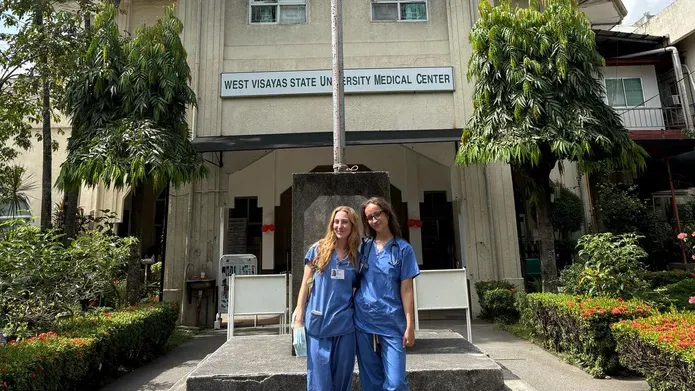News
Medical students experience eye-opening placement in the Philippines
Charlotte and Freya recently travelled to Iloilo in the Philippines during their final year of medical studies at the University of Dundee
Published on 24 July 2025

Here they tell us about their six-week placement, where they explored the differences between healthcare in the UK and the developing world.
Why did you choose to take a placement in the Philippines as part of your medical studies?
“We were inspired to undertake our elective overseas after discovering that a medical elective was part of our degree requirements. We knew we wanted to go abroad and go far, to make the most of it. We wanted to go somewhere new and exciting, and experience healthcare in a very different setting from home. Work the World offered placements in countries we were interested in, and the kind of placement experience we wanted – something new, fun, and where we could learn a lot.
“We wanted to experience a different culture and observe how another country’s healthcare system worked first-hand. We wanted to feel integrated into local life and experience living somewhere new for six weeks.
What did you experience while on this placement?
“We were shocked at how busy the placement hospital was, and it was surprising to see that patients were expected to share beds. Despite the massive workload, the staff were always in good spirits and were happy and cheerful.
“It surprised us that all patients had a bantay (a family member or friend) to help look after them and stay with them in the hospital 24/7. We were also surprised at the lack of privacy for each patient, as this was very different from home, where privacy is highly valued.
“The most significant difference in healthcare in the Philippines compared to the UK is the lack of resources. Practice often has to be adapted in the context of low-resource settings or low-income patients who cannot afford certain levels of care. Tropical diseases are far more prevalent, which results in a significant number of clinical cases we would likely not see at home.
“We learned a lot more about TB due to the high prevalence in the Philippines. We attended talks given by clerics about numerous topics, including diabetes. We developed our people skills by chatting to so many new people, staff and patients alike. We were able to ask questions to experienced staff members and learned a lot about less common conditions as well as what it is like to work in the Philippines.
“On our first day, we were involved in CPR on a patient. It was a good experience for us, but it shocked us that CPR would continue until the bantay decided they wanted it to stop. This was very different from the UK, where doctors have the power to decide whether to attempt CPR and when to cease it.
“We also observed the birth of a stillborn child in obstetrics, which was really difficult to watch. There was no privacy available for the mother, and she wasn’t offered much support during or after the event. This was very different from how it would happen at home.
“In our home country, the healthcare system receives significant funding. The system in the Philippines was far less resourced, and staff simply had to make do with what was available. But because of that, the staff were much more resourceful, and there was less waste. The lack of resources, however, did negatively impact the local staff’s ability to fully implement infection control protocols.
“Additionally, first-year doctors in the Philippines work unpaid. Their commitment to their job was truly remarkable, and we have a great deal of respect for them.
Outside of work, what was it like being in the Philippines?
“Outside of the placement itself, we lived with other healthcare students, which was a fun experience. It added a sense of familiarity to an unfamiliar environment. We all came together for breakfast and dinner and socialised together in communal areas in our downtime.
“We were able to debrief about our experiences in the hospital, how we were finding time away and spending downtime together. It was incredibly easy to make friends, and we formed connections with wonderful people from all over the world.
“During the evenings, we explored Iloilo – lots of eating out and trying local food (fish port is our favourite). In the afternoons, we visited a nearby pool, sunbathed in the garden, or went to the mall and explored the city.
“On one evening, the daughter and son of one of the nurses took us on a tour of the city. The hospitality of the locals is unmatched, and everyone we met was so generous despite not having much themselves.
“We were travelling every weekend – island hopping, boat tours, snorkelling with sea turtles, canyoneering, zip lines, jumping off cliffs and visiting as many islands as possible!
What are the benefits of undertaking a placement like this?
“There are many benefits, including experiencing a new culture more thoroughly than when on holiday and being able to integrate yourself into daily life in a new city. It allows you to meet some fantastic people and see cases you wouldn’t typically see at home.
“Our advice to others considering undertaking an overseas placement – we’d say go for it! It might be scary at first, but you soon settle in and feel at home. We have had the best six weeks of our lives, and if we could extend it, we would.”
Discover our Medicine MBChB course at the University of Dundee
Work the World specialise in creating overseas medical placements across Africa and Asia. Their destinations offer eye-opening insights into the challenges of delivering healthcare in the developing world.